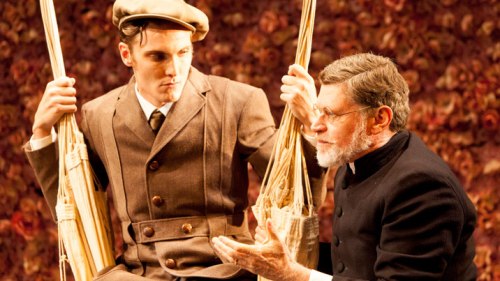Bound For Success: Review of STC’s Travelling North
Travelling North (1979) may be touted as an oddity in David Williamson’s oeuvre for its lack of satirical edge; however, those familiar with his work will still recognize the same style when it comes to scene construction, establishing characters and revealing their inner-lives. At times Williamson isn’t always the most subtle writer, and as a result he probably has as many admirers as detractors. Having said that there is nothing overrated about the Sydney Theatre Company’s latest production of Travelling North, currently being staged at the Wharf Theatre.
The play, set between 1969 and 1972, tells the simple story of Frank and Frances, a couple who have found each other late in life, fallen in love and now seek to enjoy the freedom that comes with retirement by travelling north. Frances’ daughters, Helen and Sophie are less than impressed with their mother’s plans and see Frank as an aging user who just wants a carer to look after him in his declining years. In the play’s beginning Frank appears the very picture of vitality, however, as the story progresses he develops angina. From there, the plot tracks his deteriorating health. At any rate, Frank is just as frustrated by the two daughters. He sees Helen and Sophie as wanting to use Frances as their emotional crutch when the two go through marital and child-rearing issues. Between the two positions, focus lies not only on Frances’ struggle to be with, and help the people she loves, but also on the idea of commitment; particularly when commitment means sacrifice.
Perhaps ironically, just as the north represents freedom, Frances is unable to reach either – the couple land just short of the Queensland boarder at Tweed Heads and never progress any further due to Frank’s failing health. Freedom in the north cannot be reached, and we come to see that Frances is completely smothered by her commitments to both Frank and her daughters. These burdens cause her great strain, but she continues to bear them in spite of it all: such is the strength of her love. Yet commitment rears its head in other ways throughout the play, whether it is a question of commitment to marriage, one’s political beliefs, occupation or children. Many of the characters abandon one commitment or another throughout the course of the play, and they, and the people around them, suffer the consequences. Frances though, stays strong until the end. We come to admire her for her strength and she is rewarded for it, in more ways than one.
Frank is an active senior citizen, though this is largely out of defiance. He is sensitive about his age, and is determined to defy the books. Bryan Brown was simply marvellous. He exuded an easy charisma as this cranky ex-communist, being both confident and lively whilst possessing the curmudgeon sass of a retired goat. When Frank’s condition continues to deteriorate, Brown played the arc for its comedy but also for its humanity. The increasing cantankerousness is littered with moments of enlightenment, which only an experienced actor such as Brown could pull off without being obvious.
As Helen, Frances’ Melbourne based daughter, Harriet Dyer fell head first into a sea of coarseness, and she was wonderful for it. With her big blonde hair, fetching platforms and abrasive edge, Dyer is an actress of versatility. She demanded of her audience a pace of her own choosing, so that when Helen’s inner turmoil surfaced, it was easy to see how being ‘uncouth’ is actually a defence mechanism.
Alison Whyte as Frances was an absolute trooper, having only been rehearsing the role for five days when the show was viewed. Whilst she was still script in hand for the majority of Act Two, Whyte did a deft job as this most compassionate lover and mother. It is written with confidence that Whyte will seriously impress as the run continues.
Andrew Tighe as Freddie, the obnoxious neighbour with a heart of gold, was a hoot from start to finish. The man wore his shorts well. More importantly however, Tighe captured the stereotype of the well-meaning but slightly misplaced Australian mateship envisaged by Williamson without making the character laughable in the wrong way.
Andrew Upton has offered a sound rendition of this piece. The choice to have Frances on stage throughout the entirety of the play, as a silent observer when not part of the scene, is a nice choice and undoubtedly representative of how attached she is to these people. The set is elegant in its simplicity, and one feels that with a play such as this, with scenes transitioning quickly between space and time, that David Fleischer’s multi-level timber deck design is exactly what is needed to fit the bill.
This is yet another solid production from the Sydney Theatre Company. It is an absolute treat to watch Bryan Brown on stage, and once Alison has her lines down it will be an amazing show. Give her another week. Travelling North is playing at the Wharf theatre until the 22nd of March. For more information see:
http://www.sydneytheatre.com.au/whats-on/productions/2014/travelling-north.aspx









